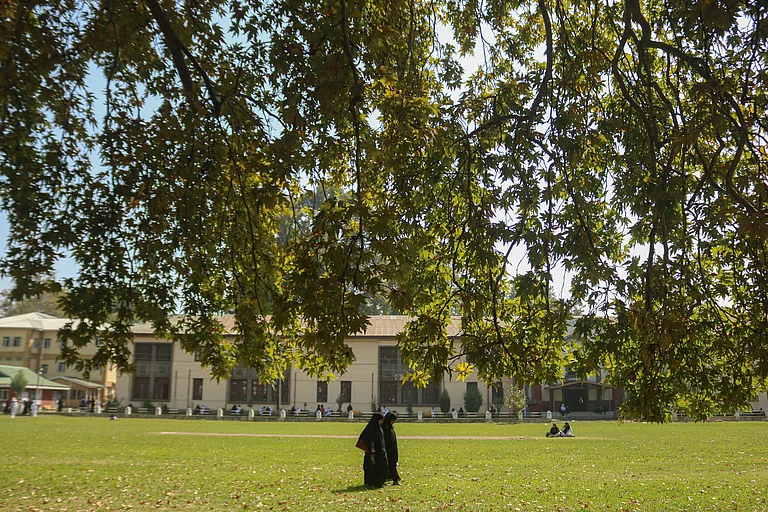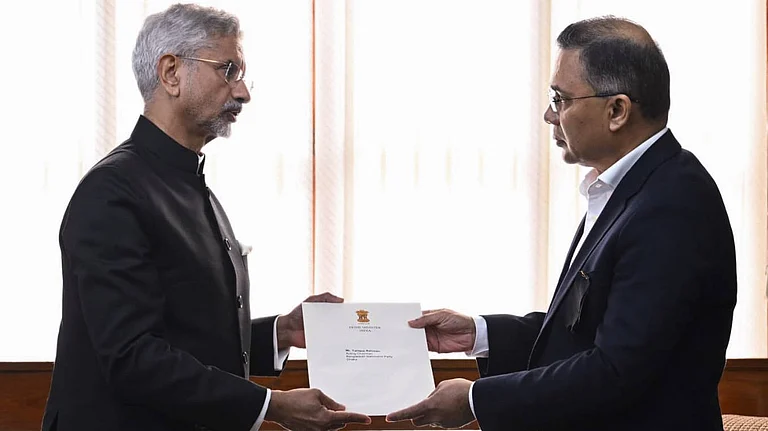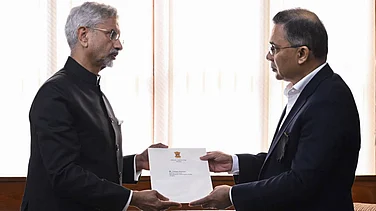Sri Lanka's newly-elected President Ranil Wickremesinghe on Wednesday said his government is preparing a national economic policy for the next 25 years to transform the crisis-hit country into a modern and competitive export economy.
Presenting his government's policy statement during the third session of Parliament, President Wickremesinghe once again invited the political parties to form an all-party government to overcome the current economic crisis as the House reconvened after a seven-day adjournment.
"I took over a country that was in disaster. Severe economic crisis on one side, massive public opposition on the other,” said Wickremesinghe, who was elected President by lawmakers on July 20 - the first such occasion since 1978.
The 73-year-old President was appointed for the rest of the term of Gotabaya Rajapaksa who fled the country and resigned on July 13 in the face of a popular uprising against his government for mismanaging the island nation's economy.
"Today, we are facing an unprecedented situation that our country has never faced in recent history. We are in great danger. The country could extricate and be secured from that danger, only if we all face this challenge together as one people,” he said, urging political parties to form an all-party government.
"I once again request all parties representing the people in this Parliament to unite in the formation of an All-Party Government. I respectfully extend the hand of friendship to all of you,” he said.
Sri Lanka has seen months of mass unrest over the worst economic crisis, with the government declaring bankruptcy in mid-April by refusing to honour its international debt.
In his address, Wickremesinghe said Sri Lanka needs long-term solutions in order to overcome difficulties.
"A strong foundation needs to be laid as not to repeat this kind of economic crisis in our country. The economy should be modernised. Economic stability should be established and transformed into a competitive export economy. In this context, we are now preparing the necessary reports, plans, rules and regulations, laws and programmes,” he told lawmakers.
Wickremesinghe said his government had initiated negotiations with the International Monetary Fund (IMF) on a four-year programme and had commenced the finalisation of a debt restructuring plan.
"We would submit this plan to the IMF in the near future, and negotiate with the countries who provided loan assistance. Subsequently negotiations with private creditors would also begin to arrive at a consensus,” he said.
Wickremesinghe said that after examining the situation in depth, his government is preparing a National Economic Policy for the next 25 years that lays the foundation for a social market economic system, securing development for the poor and underprivileged groups and encouraging small and medium entrepreneurs.
"Our aim is to create a surplus in the primary budget by the year 2025. Our effort is to raise the economic growth rate to a stable stage, in order to establish a solid economic foundation by the year 2026. Currently, public debt is 140 per cent of GDP. Our plan is to bring this down to less than 100 per cent by the year 2032.
"If we build the country, the nation and the economy through the national economic policy, we would be able to become a fully developed country by the year 2048, when we celebrate the 100th anniversary of independence,” he said.
He said the hardships had eased somewhat with reduced power cuts, fertilisers being brought in for cultivation and cooking gas distribution improving.
Wickremesinghe also thanked India and Prime Minister Narendra Modi for giving Sri Lanka "a breath of life" by providing timely economic assistance to his country as it faced the worst economic crisis in decades.
"I wish to specially mention the assistance provided by India, our closest neighbour, in our efforts of economic revitalisation,” he said.
"The government of India under the leadership of Prime Minister Modi has given us a breath of life. On behalf of my people and that of my own, I convey our gratitude to Prime Minister Modi, the Government and people of India," Wickremesinghe added.
Last week, Modi congratulated President Wickremesinghe and said that India will continue to be supportive of the quest of the people of the island nation for stability and economic recovery, through established democratic means.
The Indian government assistance to Sri Lanka has reached almost USD 4 billion since January this year. Wickremesinghe also said that the Sri Lankan economy was hit by opposition to foreign investment projects.
"When we tried to develop the oil tank complex in Trincomalee together with India, it was stated that it would be a sell out to India, and the project was halted. If at that time we were allowed to develop the oil tank complex, today people would not have to spend many days in queues for fuel,” he said.
Wickremesinghe said that he would establish an office to protect the peaceful protesters and support them.
"I will not allow any kind of prejudice to the peaceful activists," he said, while noting that some groups are trying to spread propaganda through social media that he is hunting down the protesters, which is not true.
He said he will not allow violence and terrorism. "However, I will protect non-violence and democracy. The peaceful struggle is a fundamental right. I accept those rights,” he asserted.
He said all countries are Sri Lanka’s friends. “We have no enemies. We do not belong to any group”.
Sri Lanka has seen months of mass unrest over the worst economic crisis, with the government declaring bankruptcy in mid-April by refusing to honour its international debt. The worst economic crisis since 1948 has led to severe shortages of fuel and other essentials.


























